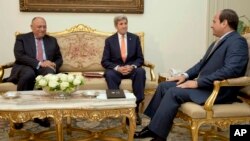Last month, comments by U.S. Secretary of State John Kerry sparked outrage in Egypt’s new parliament.
Kerry said he was concerned about Egyptian legal proceedings against foreign-funded non-government organizations and criticized what he called, “the deterioration in the human rights situation in Egypt.”
But as Kerry stopped Wednesday in Cairo for an hours-long visit en route to Saudi Arabia, his rhetoric was softer, mostly expressing solidarity with Egyptian President Abdel-Fattah el-Sissi and Egyptian Foreign Minister Sameh Shoukry on issues of security and economic cooperation.
“We also talked about ways in which we can hopefully resolve some of the differences and questions that have arisen about the internal politics and choices for the people of Egypt,” Kerry said, without saying exactly what the “differences” entail.
And some Egyptians say it is not enough.
“Foreign countries respect even the rights of dogs,” complains Ahmed, a 24-year-old college student buying cigarettes at a kiosk before hurrying back to his studies. “Why they don’t comment more on human rights in Egypt?”
But at a shop selling cleaning supplies in a Cairo suburb, clerk Hany Khalaf Abdelgawad says he wants the government to ensure outside political agendas don’t gain influence in Egypt to the detriment of the local people.
“Foreign countries use the human rights as a cause to intervene in our business,” he explains. “And America puts itself first and then a partnership comes after.”
Foreign funding
And some officials say foreign countries are injecting their political interests into Egyptian society through funding organizations some members of parliament accuse of working to “spread an agenda of anarchy and chaos.”
Several research organizations and human rights groups are under investigation, and a criminal court has adjourned until May 23, after re-affirming the freezing of the assets of four prominent rights advocates and their families, according to local Arabic media.
Rights groups call the investigations a “clear plan to prosecute the entire independent human rights movement.”
“The closure of human rights and women’s rights groups will lead to a rapid spike in human rights abuses,” says the Egyptian Initiative for Personal Rights, one of the organizations currently under investigation.
Other well-known groups being investigated include Nazra for Feminist Studies, and the Arabic Network for Human Rights Information.
On Tuesday an administrative court ruled non-government organizations have the right to accept foreign money if it doesn’t harm general peace and security or negatively affect public morality, according to Ahram Online, an Egyptian state-owned news source.
But already in place is a 2014 law that requires the government approve all foreign funding, says Ziad Akl, a senior researcher at the Al Ahram Center for Strategic Studies in Cairo. Even without the current investigations, he calls the law “vastly effective” at having a chilling effect on funding projects at research centers and other civil society organizations.
And the international community, he says, increasingly lacks interest in supporting activist movements in the Arab World as security concerns mount.
“They’re back at the point where they are thinking: ‘Maybe what we need to support is stability and not democratization,’” he explains.
Case No. 173
On Wednesday, United Nations Secretary-General Ban Ki-moon announced that he would be monitoring the non-government funding case in Egypt, also known as Case No. 173.
“Defendants in the case must be able to benefit from all due process and fair trial standards,” said Ban's spokesperson in a statement.
The case began in late 2011, when Egypt was officially under military rule after the fall of then-president Hosni Mubarak. At that time several non-governmental organizations were raided, eventually leading to dozens of convictions in relation to charges of receiving illegal foreign funding.
The sentences were largely imposed in absentia or suspended, but rights groups say punishments could be harsher this time around.
On his way back from court, Mohamed Elraaie, an Egyptian photojournalist covering the case, says it appears to be gaining steam, as more names are added to the list of defendants.
This comes at a time where opposition voices are growing after the Egyptian government pledged to transfer two islands to Saudi Arabia.
“What is weird that the case was opened again,” he explains on a busy downtown street. “But it’s not my job to comment on whether or not the case is fair.”
At a nearby barbershop, as Mohamed Ahmed waits for new clients, he says he agrees with investigating organizations that are tasked with shaping this society and funded elsewhere.
“Maybe the government will find out they are telling lies,” he says. “If they’ve been bought, perhaps they could lie and take the money.”
Hamada Elrasam contributed to this report.








